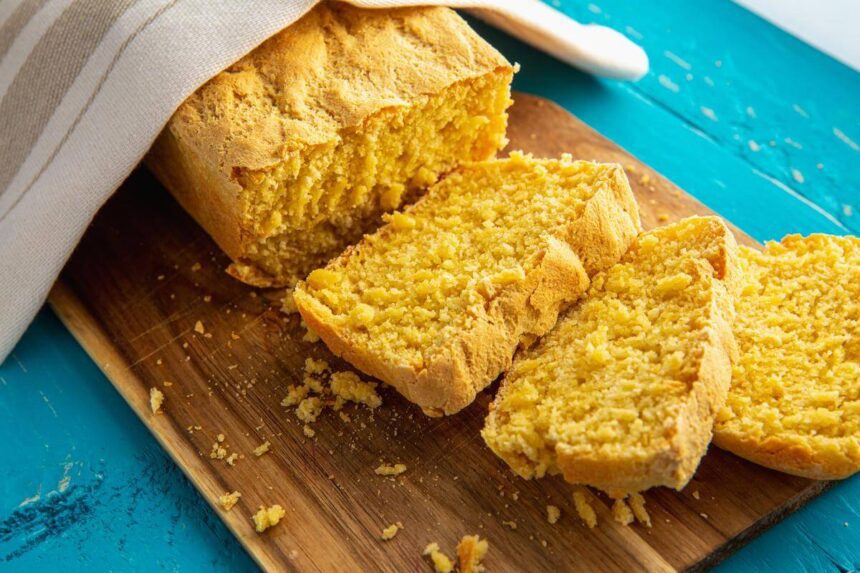As a cat owner, you might be curious about what foods are safe to feed your feline friend. One question that may come up is whether or not cats can eat cornbread. While cornbread might seem like a harmless snack, it’s important to know what ingredients are in it and how they can affect your cat’s health.
In this article, we will explore the nutritional content of cornbread, the potential benefits and risks of feeding it to your cat, and some alternative snacks that may be better suited for your feline companion.
What is Cornbread?
Cornbread is a type of bread made from cornmeal, flour, and other ingredients like sugar, eggs, milk, and baking powder. It is a popular comfort food in many parts of the world, especially in the southern United States. Cornbread can be baked in a variety of shapes and sizes, such as muffins, loaves, and skillet cakes.
Nutritional Content of Cornbread
The nutritional content of cornbread can vary depending on the recipe and the brand. Generally, cornbread is high in carbohydrates and calories, with little protein or fat. Here is the nutritional information for a typical serving of cornbread (one slice, about 2.5 ounces):
- Calories: 190
- Carbohydrates: 31 grams
- Protein: 3 grams
- Fat: 6 grams
- Fiber: 1 gram
- Sugar: 7 grams
Cornmeal is the primary ingredient in cornbread, and it is a good source of carbohydrates. However, it is not a complete source of protein, and it lacks essential nutrients like vitamins A, C, and E, as well as calcium and iron.
Can Cats Eat Cornbread?
While cats can technically eat cornbread, it is not recommended as a regular part of their diet. Cats are obligate carnivores, which means that they require a diet that is high in protein and fat and low in carbohydrates.
Cornbread is high in carbohydrates and low in protein and fat, which means that it does not provide the optimal nutrition that cats need to thrive. In addition, cornbread may contain other ingredients that can be harmful to cats, such as sugar, salt, and spices.
Feeding your cat a diet that is high in carbohydrates can lead to a number of health problems, including obesity, diabetes, and dental issues. While it is okay to give your cat small amounts of cornbread as an occasional treat, it should not be a regular part of their diet.
Potential Benefits of Cornbread for Cats
While cornbread is not an essential part of a cat’s diet, it may have some potential benefits when given in moderation. Here are some of the potential benefits of cornbread for cats:
Source Of Carbohydrates
Cornbread is a good source of carbohydrates, which can provide your cat with energy and help keep them full between meals.
Fiber
Cornbread contains a small amount of fiber, which can aid in digestion and help prevent constipation.
variety
Giving your cat a small amount of cornbread as a treat can provide them with some variety in their diet and prevent them from getting bored with their food.
Potential Risks of Cornbread for Cats
While cornbread may have some potential benefits for cats, it also carries some risks. Here are some of the potential risks of feeding cornbread to your cat:
Obesity
Feeding your cat a diet that is high in carbohydrates can lead to weight gain and obesity, which can increase the risk of other health problems like diabetes and joint issues.
Digestive issues
Cats are not adapted to digest large amounts of carbohydrates, and feeding them foods like cornbread can lead to digestive issues like diarrhea and vomiting.
Allergic reactions
Some cats may be allergic to corn or other ingredients in cornbread, which can cause symptoms like itching, swelling, and respiratory distress.
Nutrient deficiencies
Cornbread is not a complete source of nutrition for cats, and feeding it as a regular part of their diet can lead to nutrient deficiencies and other health problems.
Diabetes
Feeding your cat a diet that is high in carbohydrates can increase their risk of developing diabetes, a chronic condition that can cause a range of health problems.
Alternative Snacks for Cats
If you’re looking for some healthy snack options for your cat, there are plenty of alternatives to cornbread that are better suited for their nutritional needs. Here are some healthy snacks that you can give your cat:
Canned tuna
Canned tuna is a good source of protein and omega-3 fatty acids, which can support your cat’s overall health and wellbeing. However, it is important to avoid feeding your cat too much tuna, as it can be high in mercury.
Cooked chicken
Cooked chicken is a great source of protein and is easy to digest. You can feed your cat small amounts of cooked chicken as a treat or mix it into their regular food to add some variety.
Plain yogurt
Plain yogurt is a good source of probiotics, which can help support your cat’s digestive health. However, it is important to choose a plain, unsweetened yogurt that does not contain any artificial sweeteners or additives.
Catnip
Catnip is a plant that is safe and non-toxic for cats, and many cats love the smell and taste of it. You can give your cat a small amount of fresh or dried catnip as a treat, or sprinkle some on their food to add some flavor.
Fresh vegetables
Some cats enjoy eating fresh vegetables like broccoli, carrots, and green beans. While vegetables are not a necessary part of a cat’s diet, they can provide some additional nutrients and fiber.
FAQs
Can cats eat any type of bread?
While cats can technically eat some types of bread, it is not recommended as a regular part of their diet. Bread is high in carbohydrates and low in protein and fat, which means that it does not provide the optimal nutrition that cats need to thrive.
Can cats be allergic to corn?
Like humans, cats can develop allergies to certain foods, including corn. If your cat is allergic to corn, they may experience symptoms like itching, swelling, and respiratory distress. If you suspect that your cat has a food allergy, it is important to talk to your veterinarian to determine the underlying cause and develop an appropriate treatment plan.
Conclusion
In conclusion, while cats can technically eat cornbread, it is not recommended as a regular part of their diet. Cornbread is high in carbohydrates and low in protein and fat, which means that it does not provide the optimal nutrition that cats need to thrive. In addition, cornbread may contain other ingredients that can be harmful to cats, such as sugar, salt, and spices.
Feeding your cat a diet that is high in carbohydrates can lead to a number of health problems, including obesity, diabetes, and digestive issues. While it is okay to give your cat small amounts of cornbread as an occasional treat, it should not be a regular part of their diet.
If you’re looking for healthy snack options for your cat, there are plenty of alternatives to cornbread that are better suited for their nutritional needs. Canned tuna, cooked chicken, plain yogurt, catnip, and fresh vegetables are all healthy snack options that can provide your cat with some variety in their diet and support their overall health and wellbeing.



